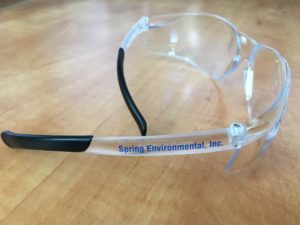The January HAZWOPER Challenge is now closed. Thank you for participating. Please come back February 1st for our next HAZWOPER Challenge!
Category Archives: Announcements
December HAZWOPER Challenge
November HAZWOPER Challenge
October HAZWOPER Challenge
Chemical Security – It’s Everyone’s Business!
As more and more chemicals are used throughout the world to provide for our daily needs, the threat surrounding chemicals also grows. Chemicals can be used in many applications to harm people, wildlife, or the environment. There have been many instances in history where chemicals were used in terrorist activities such as bombs, gas releases, or poisonings. The government has utilized the Chemical Facility Anti-Terrorism Standards (CFATS) as a means to combat the illegal procurement of dangerous chemicals and enhance security initiatives for facilities that engage with targeted chemicals. Recently the federal government has let the funding for CFATS lapse, so the program standards can no longer being enforced by the Cybersecurity & Infrastructure Security Agency (CISA).
According to the FBI, attempted fraudulent purchases of dangerous chemicals have been steadily increasing in recent years. Without the tools, oversight, and background programs that CISA provides through CFATS, it now falls on the facilities to clamp down on their chemicals and be more diligent in their security efforts. CISA is urging lawmakers to approve funding for CFATS to return the program to operational status, but until that happens, chemical managers need to be on heightened alert. There are still tools available that facilities can use to aid them such as ChemLock. According to CISA, “the ChemLock program is a completely voluntary program that provides facilities that possess dangerous chemicals no-cost services and tools to help them better understand the risks they face and improve their chemical security posture in a way that works for their business model.”
For more information regarding the ChemLock, click here.
If you have any questions regarding the programs, drop us a line. We’d be happy to assist.
September HAZWOPER Challenge
August HAZWOPER Challenge
Permanent Outdoor Heat Exposure Rules Approved!
On June 27, 2023 Washington State Department of Labor & Industries (L&I) adopted the revised permanent rules for Worker Outdoor Heat Exposures. Washington has been operating under emergency rules during the last two summers while the permanent rule was being developed. With the approval, the new regulations went into effect July 17, 2023.
In the new guidance, employers and employees will find new and updated information to protect workers while working in outdoor heat conditions. The new standards will apply year-round when the action levels outlined in Table 1, 52oF for non-Breathable clothing and 80oF for all other clothing, are exceeded. Some additions and revisions that were made include:
• New/updated definitions
• Response to heat induced illnesses
• Information and Training program requirements
• Shade requirements
• Acclimatization guidelines
For more information, check out our regulatory update fact sheet or Be Heat Smart (wa.gov) for access to resources such as posters, videos, and training materials.
* The Federal rulemaking for Heat Illness Prevention in Outdoor work settings is currently in the Pre-rule stage of development.
July HAZWOPER Challenge
Spokane Area Burn Ban (6/30/2023)
Burn restrictions have been put in place by Fire Marshals from the Spokane Valley Fire Department (SVFD), City of Spokane Fire Department (SFD), Spokane County, City of Cheney, City of Airway Heights, and City of Deer Park as of June 30th, 2023, at 12:01 am.
Unauthorized open burning and unauthorized recreational fires are restricted until this order is lifted or unless otherwise permitted by law enforcement or authorized agencies. Manufactured portable outdoor devices are allowed and appropriate fuels in appropriate devices are also allowed. Designated campfires in parks and campgrounds may be allowed as approved and determined by agencies with jurisdiction. Confused? Check out this flyer for the quick Do’s and Don’ts of burning.
Spokane Fire Department (SFD) Fire Marshal, Lance Dahl provided some guidelines for a safe fire season below:
Only burn in approved devices.
Have a fire extinguisher and/or a hose accessible.
Be kind to your neighbors and only burn clean dry wood.
Remember to watch for burn restrictions related to our smoke particulate index.
Current restrictions can be found at https://spokanecleanair.org/burning/burn-restrictions/ or the Burn Info Hotline at (509) 477-4710.

